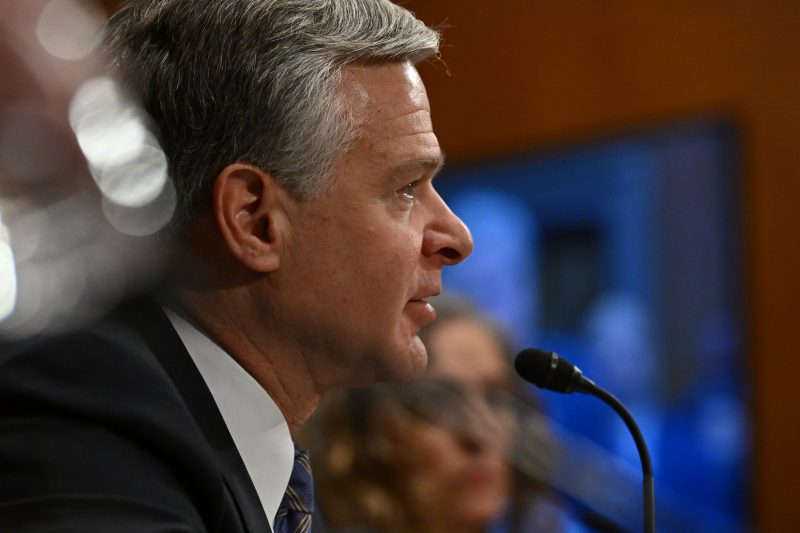FBI Director Christopher A. Wray, who has been increasingly under attack from congressional Republicans, pushed back against his critics in a new interview, saying the people accusing the law enforcement agency of bias are themselves trying to gain a political advantage at the FBI’s expense.
“I have found almost invariably, the people screaming the loudest about the politicization of the FBI are themselves the most political, and more often than not, making claims of politicization to advance their own views or goals, and they often don’t know the facts or are choosing to ignore them,” Wray said in a Wednesday episode of the podcast “FBI Retired Case File Review.”
Wray pointed out, as he has before, that when President Donald Trump nominated him in 2017 to be the FBI director, not a single Republican senator voted against him. “It’s utterly bewildering to me that I or the FBI would be accused of bias against conservatives or any political party,” he said.
A number of Republican congressmen — particularly lawmakers loyal to Trump — have been on the warpath against the FBI, threatening to cut the agency’s funding and reduce its legal authority over what they claim is a pattern of politically motivated decision-making in cases involving elected officials and President Biden’s son Hunter.
That bad blood was evident Tuesday when Wray appeared before the Senate Homeland Security and Governmental Affairs Committee and was attacked by Sen. Ron Johnson (R-Wis.) over the Hunter Biden investigation.
Johnson accused the FBI of trying years ago to smear him and hurt his reelection bid, and he went on to complain that he wasn’t being given enough information about criminal investigations from the FBI and that he could not trust the information that the agency has shared with him.
“I’m an elected U.S. senator,” Johnson said. “Why is it that unelected members of the FBI can see the documents unredacted but I can’t?” Johnson went on to claim the FBI’s credibility “has been destroyed.”
Exasperated, Wray defended the bureau and his own conduct. “The idea that I, as a Republican appointee and a lifelong Republican, is biased in the way that you are describing makes absolutely no sense,” he said.
The FBI is unusual among federal agencies in that it has only one position — the director — which is nominated by the president and confirmed by the Senate. FBI directors serve at the pleasure of the president, but they are appointed to 10-year terms, and it is common for them to serve both Republican and Democratic presidents, as Wray has.
In the podcast interview, which was recorded well before Tuesday’s hearing, Wray said that defunding the FBI — an idea that has been discussed by some conservatives and embraced by Trump — would be destructive and dangerous. The FBI investigated two cases that have led to federal indictments of Trump. He is set to go on trial next year in both cases, one involving alleged mishandling of classified documents and the other related to his alleged conspiracy to obstruct the results of the 2020 presidential election.
“These calls for defunding or even dramatically limiting our funding would at best be shortsighted and reckless, and at worst be catastrophic,” Wray said. “Defunding, who does it help? … Violent gangs, child predators, Chinese spies and hackers.”
He also bemoaned a growing trend in U.S. politics of attacking institutions.
“I think all too often in today’s world, people’s standard for whether something was fair or objective or independent — whether you’re talking about an FBI investigation, a Supreme Court decision or even an election — is whether they liked the result,” the director said. “That’s not how independence and objectivity work. … This tendency to attack the motives and legitimacy and integrity of institutions when you don’t like the result is not healthy or productive.”
Wray’s interview marked the 300th episode of the “FBI Retired Case File Review,” which features interviews with former agents about how they worked investigations ranging from the Sept. 11, 2001, terrorist attacks to check-kiting con men.
The podcast host, Jerri Williams, is a retired agent who said she is alarmed by some of the more heated political rhetoric aimed at the FBI, but she also noted that the bureau’s history is full of that type of criticism, at least at the local level.
“There were definitely moments during my career when the FBI was accused of being political,” she said, citing accusations years ago that agents were trying to affect the race for Philadelphia mayor. “I think nothing has changed, other than the strategy is being played on a national scale.”
Williams said she sees a lot of criticism of the FBI in social media and news reports, but she seldom encounters it anywhere else. “Perhaps we’re paying too much attention to those making the noise? If podcasts, books, TV shows and movies are any indication about how the public really feels about the bureau, we’re doing just fine.”








